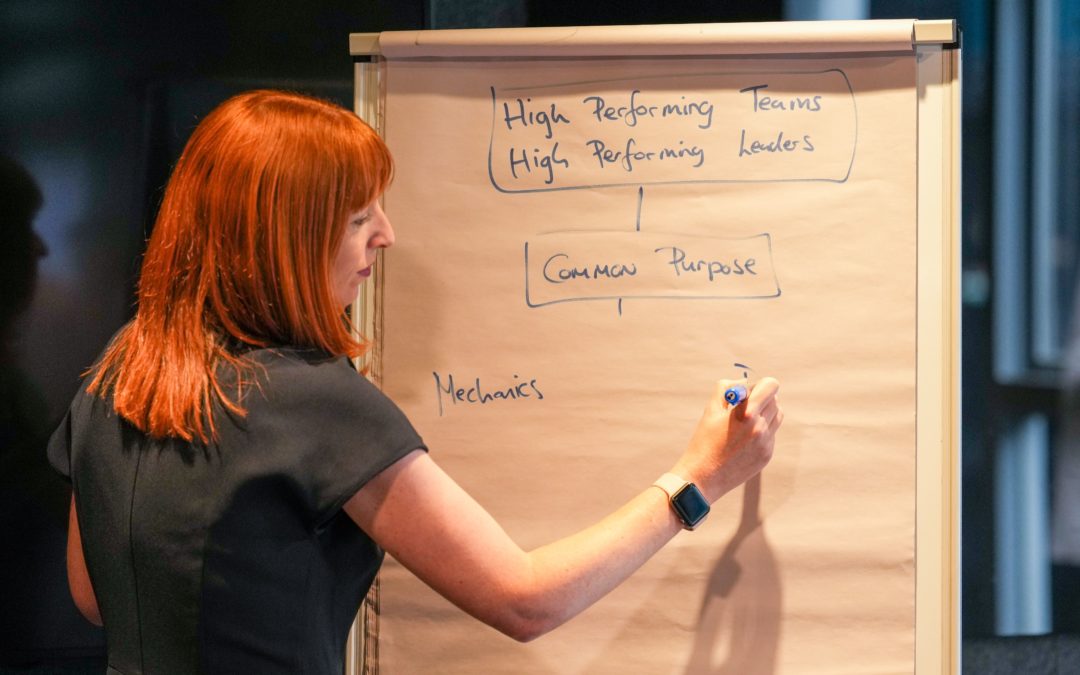The Covid-19 pandemic has meant that most organisations have had to adopt flexible working initiatives for their teams. Vast changes in our working life have occurred, including part-time work, and working from home which has accelerated changes in the nature of work. So as leaders of high performing teams, how do we ensure that if we have to reinvent the way we do things, we consider both the mechanics and dynamics of our team?
In any given team there are two major components linked to high performance. The first is the mechanics – what you do – things like systems, processes, budgets, strategy, and day to day tasks. The second is the dynamics – how you do it – the behaviours we accept and the culture it creates. Culture does not just happen overnight. It needs attention, nurturing and nourishing every day and in a variety of ways. For successful organisations this needs to be as much a focus as budgets and strategies – pillars paramount to our success. I would like to show you one small example of how Leading Teams, has done this recently.
Our organisation has been operating successfully in Australia for over 25 years and growing our team has been both challenging and rewarding. When we started, the majority of our clients were elite sports organisations and therefore our staff mirrored our clients. As a result, many of our team, though not all, had come from in elite sport and majority were men.
When we looked externally to recruit in the past, the applications we received were mainly from, you guessed it, men with a history in elite sport. As an organisation we understood the benefits of having a diverse team. It would provide internally and externally broader perspectives and experiences that would strengthen corporate and organisational intellectual capital, problem solving and innovation.
When people started to work with us and experience our culture, they felt at home straight away – our internal satisfaction ratings were 85% across team members. The real challenge was that we only had 7% of women applying for jobs. Diversity brings great rewards in the workplace and trending commercial benefit of this change. According to Deloitte, diverse companies enjoy 2.3 times higher cash flow per employee. Interestingly, Gartner found that inclusive teams improve team performance by up to 30 percent in high-diversity environments. In a BCG study, companies with diverse management teams had a 19 percent increase in revenue compared to their less diverse counterparts.
We wanted to find the people who are the right fit for us, and who we are the right fit for, while at the same time changing the gender mix. Sounds like a big change? The solution was simpler that you would think.
Practicing what we preach.
Leading Teams decided to examine the reasons for our low number of female applicants. The first step was to have a female staff member lead the process, so that we were leading with the change we wanted to see. Then we looked at the mechanics of our process and we relied on our methodology. We do this as part of our practice, not only because we back ourselves, but because we recognise the need to learn, amend and adapt by experimenting. We began by reviewing our recruitment documentation, including our job description and expression of interest advertisements, then considered the broader process.
The results were clear and surprisingly simple. It was clear that all genders were attracted to the role evenly, and when they got to the interview stage were recruited evenly, however the roadblock was at application stage. Women weren’t applying for the job.
Changing our language changed the results.
Was there a bias to our recruitment process as opposed to the culture of our business? What was stopping women from applying? Was it because they weren’t interested in the role itself or because they weren’t interested in working for us? According to a Harvard study, men apply for a job when they meet only 60% of the criteria, but women apply only if they meet 100% of them. So we did a test. For our next round of recruitment, we asked our female employees and our broader network to tell us what workplace benefits they were attracted to when applying for roles.
The good news was we were already offering these benefits, just not speaking about them in the job ads. We highlighted the benefits Leading Teams provides that were missing from our advertisements, such as a flexible working roster, parental leave, our bonus structure, travel allowance, car allowances. We also scanned our documents through a gender decoder. Our language was 92% male dominated. We fixed this easily without changing our criteria for employment.
Small changes, big result.
The results were significant. We went from having an application rate by females of 7% to 47% in one round.
Things to consider:
Often, we miss opportunities for growth. When an issue or opportunity for growth presents itself, we look straight to our team and focus on blame or justification of the status quo. The opportunity is to depersonalise the issue and to review your mechanics in order to improve. Some questions you can ask include:
- What is the change we want or where is there a gap?
- What does success look like?
- Have we brought the right people into this conversation?
- What is our process now?
- Where is the problem space?
- How can we fix it together?
Sometimes it is a slight change that enables growth. Working in a team that is empowered to improve the business keeps me motivated and engaged, and that is why I love working for a team that constantly practices what we preach. There’s a great quote I hear often at work – “none of us are as smart as all of us”. By breaking down seemingly large issues into these component parts, you’ll be amazed at what you and your team can achieve.





